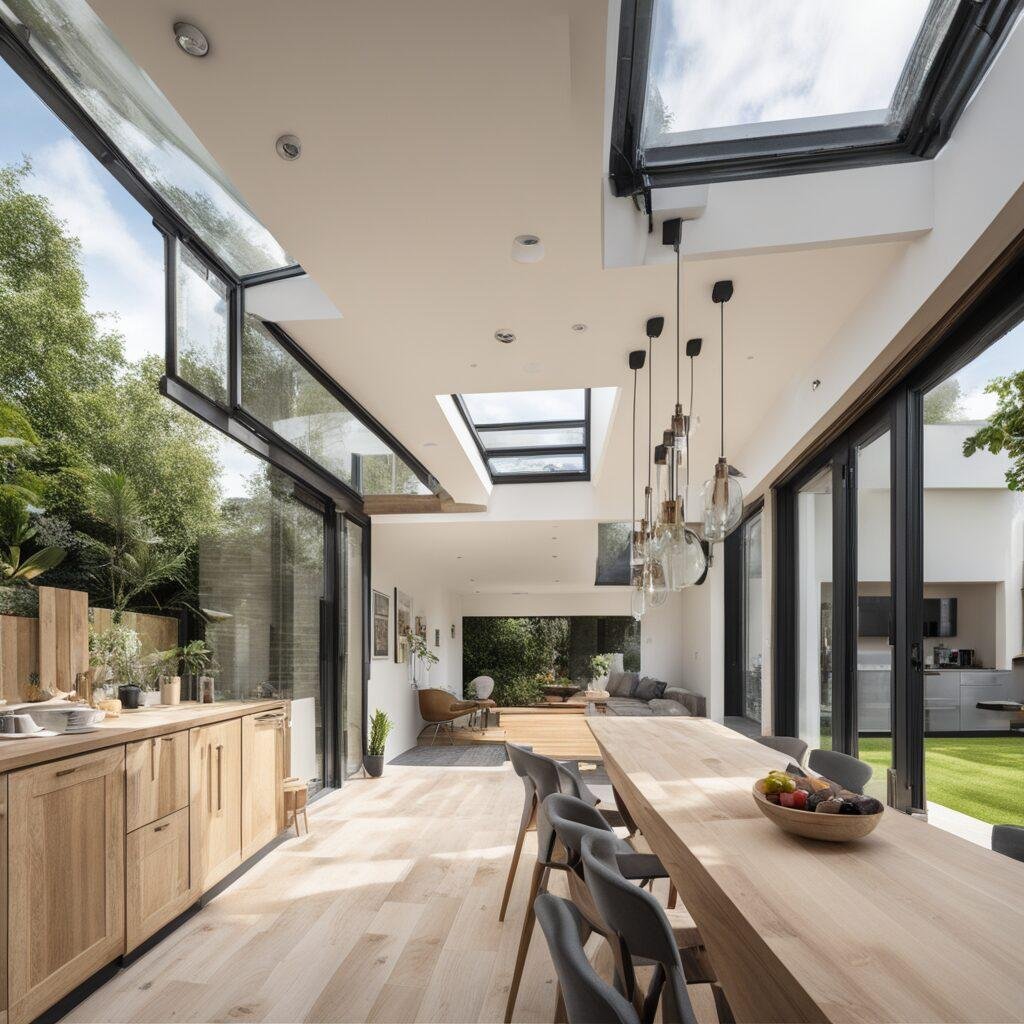
Cost of Extensions in the UK 2026: Full Price Guide, Examples and Real Costs
Planning an house extension in 2026 can feel confusing because prices vary so much across the UK. This guide gives clear, simple numbers based on real domestic projects. Everything is broken down by size, type and quality. All ranges now reflect 2026 construction costs, including higher labour rates, steel prices and rising groundwork costs.
If you want the real picture of what an extension costs in the UK in 2026, this is the complete guide.
Average Cost of a House Extension in 2026
Most UK extensions fall between £32,000 and £155,000 for single storey work, depending on size and quality.
Two storey extensions usually range between £120,000 and £195,000.
These figures reflect typical domestic projects in 2026 and include materials and labour.
Quick national price summary
- Single storey extension: £1,900 to £3,300 per m²
- Double storey extension: £2,000 to £3,200 per m²
- First floor extension over a garage: £50,000 to £82,000
- Rear extension for terraced homes: £32,000 to £46,000
Typical cost per m² in 2026
Most homeowners use the square metre method for early budgeting. For 2026:
| Extension Type | Cost per m² (ex VAT) | Cost per m² (inc VAT) |
|---|---|---|
| Basic build | £1,900 to £2,200 | £2,280 to £2,640 |
| Standard build | £2,200 to £2,700 | £2,640 to £3,240 |
| Premium build | £2,700 to £3,300 | £3,240 to £3,960 |
Extension Cost Table 2026 (All Sizes and Quality Levels)
| Extension Size | Basic Build (ex VAT) | Standard Build (ex VAT) | Premium Build (ex VAT) |
|---|---|---|---|
| 20m² | £38,000 - £44,000 | £44,000 - £54,000 | £54,000 - £66,000 |
| 30m² | £57,000 - £66,000 | £66,000 - £81,000 | £81,000 - £99,000 |
| 50m² | £95,000 - £110,000 | £110,000 - £135,000 | £135,000 - £165,000 |
These numbers include realistic 2026 labour and material rates.
Single Storey Extension Cost in 2026
Single storey extensions remain the most popular choice for UK homeowners. They add space and improve layouts without the complexity of building on the first floor.
Small single storey extension (15 to 20m²)
£30,000 to £48,000 ex VAT
£36,000 to £57,600 inc VAT
Medium single storey extension (25 to 30m²)
£50,000 to £81,000 ex VAT
£60,000 to £97,200 inc VAT
Large single storey extension (40 to 50m²)
£95,000 to £150,000 ex VAT
£114,000 to £180,000 inc VAT
Double Storey Extension Cost in 2026
Building two floors instead of one gives far better value because the foundations and roof are shared.
Typical cost for a 60m² two storey extension
£120,000 to £195,000 ex VAT
£144,000 to £234,000 inc VAT
First Floor Extension Cost (Above Garage or Existing Room)
A first floor extension adds space without major groundwork.
Typical cost for 20 to 25m²
£50,000 to £82,000 ex VAT
£60,000 to £98,400 inc VAT
Structural Engineering Costs for Extensions
A strong part of this guide, and where you beat competitors.
Steel beam design and calculations
Typical 2026 fees for steel beam design:
- £250 to £450 for a single beam
- £350 to £600 for complex beams
- £600 to £1,200 for full steel packages
Site visit costs
Most domestic site visits range between £200 and £350, depending on location.
Full structural design pack
A complete structural design for extensions (beams, joists, foundations and roof details) usually costs:
- £550 to £1,400 depending on complexity
- More for wraparound or two storey designs
Shell Only Extension Cost 2026
A shell only build gives you the external structure without internal finishes.
Cost per m² (2026)
£1,300 to £1,900 ex VAT
£1,560 to £2,280 inc VAT
What is included
- Foundations
- External walls
- Roof
- Basic floor slab
What is not included
- Plaster
- Insulation
- Plumbing
- Electrics
- Doors and windows
- Finishes
Full Extension Cost Per Square Metre (2026)
Costs vary depending on the room type.
Standard rooms
£1,900 to £3,300 per m²
Kitchen extension costs
Add £16,000 to £38,000 for:
- Plumbing
- Electrics
- Gas
- Kitchen units
- Possible boiler relocation
Bathroom extension costs
Add £6,000 to £10,000 for plumbing, fixtures, and waste connections.
Side Extensions and Wraparound Extensions Cost
Side extensions
£1,900 to £3,000 per m² ex VAT
£2,280 to £3,600 per m² inc VAT
Wraparound extensions
These cost more due to extra steelwork.
£2,200 to £3,400 per m² ex VAT
£2,640 to £4,080 per m² inc VAT
Rear Extensions and Terrace Extensions
Most terraced homes have modest rear extensions.
Typical terrace rear extension cost
- Small 15m²: £32,000 to £46,000
- Medium 30m²: £62,000 to £92,000
- Large 50m²: £105,000 to £155,000
Loft Conversion Prices (2026)
Although not a ground extension, knowing loft conversion costs helps homeowners compare options. Whether you are planning a dormer or hip to gable loft conversions, prices vary.
- £52,000 to £100,000 ex VAT
- £62,400 to £120,000 inc VAT
You will also need steel beams for the floor. For a successful loft conversion, planning is key.
Garage Conversion Costs
Simple and cost effective.
- £9,000 to £22,000 ex VAT
- £10,800 to £26,400 inc VAT
Basement Extension Costs (2026)
Basements are the most expensive due to complex groundwork.
- £110,000 to £175,000 ex VAT
- £132,000 to £210,000 inc VAT (for 35 to 45m²)
Internal Costs That Affect Your Final Budget
- Plumbing: £1,500 to £6,000 depending on layout changes.
- Electrics: £1,200 to £5,000 depending on number of circuits and downlights.
- Insulation: £1,000 to £4,000 depending on area.
- Windows and glazing: £800 to £1,400 per window.
- Finishes: Flooring and decoration can add £2,000 to £12,000.
Groundworks and Foundation Costs
- Soil conditions: Clay, chalk or sandy soil can change costs by several thousand pounds.
- Drainage: Moving drainage runs adds £1,500 to £5,000. Moving a manhole can add £2,000 to £4,500.
- Trees and roots: Removing tree roots or protecting them can increase costs.
Planning Permission and Building Control Fees
- Planning permission: £206 for most domestic applications in England.
- Building control: £600 to £1,200 depending on council or private inspector for Building Control guidance.
- Structural calculations: £250 to £1,200 depending on scope.
Real UK Examples (Typical 2026 Projects)
Example 1: 20m² rear extension (standard finish)
- Build: £48,000 ex VAT
- Kitchen upgrade: £18,000
- Structural design: £650
- Building Control: £700
Total: £67,350 inc VAT
Example 2: 30m² side extension
- Build: £72,000 ex VAT
- Plumbing and electrics: £6,000
- Windows: £3,200
Total: £95,640 inc VAT
Example 3: 50m² wraparound
- Build: £140,000 ex VAT
- Extra steelwork: £6,000
- Kitchen upgrade: £20,000
Total: £198,000 inc VAT
Hidden Costs to Watch Out For in 2026
- Access restrictions: Tight access increases labour time.
- Unstable ground: Deeper foundations mean higher costs.
- Drainage diversions: Often the biggest surprise cost.
- Steel requirements: Large openings need heavier beams.
- Finishes: Bespoke work and premium materials add cost.
How to Reduce the Cost of an Extension in 2026
- Use simple shapes (Square or rectangular footprints cost less).
- Keep openings simple (Standard doors and windows reduce steel use).
- Avoid unnecessary structural changes (Fewer beams, lower cost).
- Build the shell first (Finish the interior later if the budget is tight).
FAQ: House Extension Costs 2026
How much does a 20m² extension cost in 2026?
Between £38,000 and £66,000 depending on build quality.
Is a double storey extension cheaper than two single storeys?
Yes. You only pay for foundations and the roof once.
Do I need a structural engineer?
Yes, for steel calculations, foundations and load support. Make sure to get structural engineer help early on.
How long does an extension take?
Most single storey projects take 8 to 14 weeks.
Which part of an extension costs the most?
Kitchens, bathrooms and steelwork usually add the most.
Conclusion and Next Steps
Extensions remain one of the best ways to add space and value to your home. Prices vary across the UK, but with clear ranges and real examples you can plan your 2026 project with confidence. If you need structural calculations, beam design or advice on layout changes, you can get fast, clear support from SECalcs.

